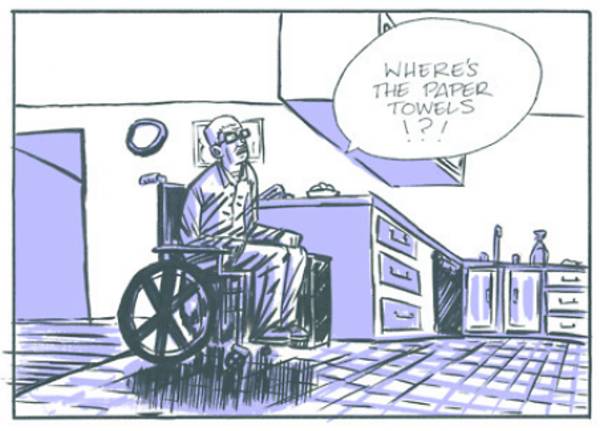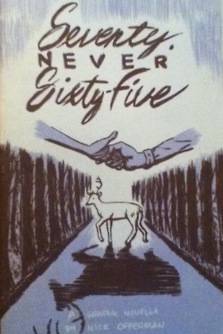 Home > CR Reviews
Home > CR Reviews Seventy, Never Sixty-Five
posted October 5, 2011
Seventy, Never Sixty-Five
posted October 5, 2011

 Creator:
Creator: Nick Offerman
Publishing Information: Self-Published, mini-comic, 48 pages, 2011, $4
Ordering Numbers: available
here

I think the basic appeal of this self-trumpeted "graphic novella" from student cartoonist Nick Offerman is how dark elements of it are, and how refreshing it is to see any comic based on an emotional portrait rather than some sort of visual hook.
Seventy, Never Sixty-Five details a change of heart in a man trapped in a wheelchair and an even more oppressive and limiting framework of emotions. The best moments are those that look in unflinching detail at how miserable our protagonist is at what's happened to him, and a subtle shift in emphasis from a kind of practiced, petty resentment to an increasingly panicked feeling of inadequacy when it comes to his relationship to his wife. None of it is pretty, but the man's quandary becomes surprisingly affecting for how ruthless Offerman can be in portraying the core ugliness of those feelings. The cartoonist also loads on the metaphorical weight, with a bunch of material on accepting the monotony of life, narrow roads and even the idea of increased speed limits as a kind of worrisome over-freedom, all of which help gird the work's generally bleak outlook. The epiphany the man experiences almost works because Offerman's unsparing commitment to misery, but in the end the physical plot points that get him (and us) to that better place feel overly manufactured and slightly twee. It might have been easier to accept the poetic change of heart if it had come, as the lead's misery had, from the everyday realities of what he was facing rather than via a grand and over-the-top instance of acting out.
As a cartoonist, Offerman either has a very expressive way of delineating space or has a ways to go in craft terms in terms of routinely depicting the everyday reality of his settings. The two houses shown seem more like stage sets than lived-in homes, vehicles for empty rooms in which a specific instance of drama can play itself out. He does this nice thing with perceived distance in a scene in a married couple's car that doesn't quite hit with force because our initial encounter with the pair in the auto fails to nail that sense of forced closeness that sitting in a car brings with it. There's a nice attempt on several pages at a faded printing style -- ambitious for a self-published mini -- to show flashback scenes that doesn't all the way work unless the idea was to show how difficult it is to access memories. Then again, it's infinitely preferable for a young cartoonist to work ahead of their chops rather than always limit themselves to what's easiest. Hopefully, the moments in
Seventy, Never Sixty-Five that are more effective than others and the bare emotional landscape will hold greater sway over the cartoonist's future than the way the plots tumbles into a mostly unbelievable set of actions at its climax.


